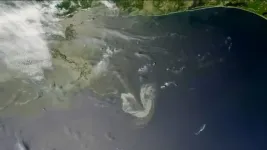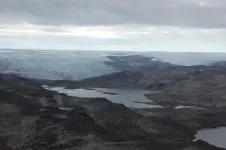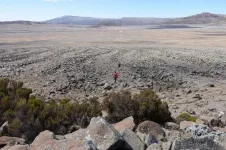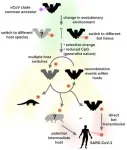Oil in the ocean photooxides within hours to days, new study finds
Study provides new details on the fate of spilled oil in the marine environment, effectiveness of chemical dispersants
2021-03-12
(Press-News.org) MIAMI--A new study lead by scientists at the University of Miami (UM) Rosenstiel School of Marine and Atmospheric Science demonstrates that under realistic environmental conditions oil drifting in the ocean after the DWH oil spill photooxidized into persistent compounds within hours to days, instead over long periods of time as was thought during the 2010 Deepwater Horizon oil spill. This is the first model results to support the new paradigm of photooxidation that emerged from laboratory research.
After an oil spill, oil droplets on the ocean surface can be transformed by a weathering process known as photooxidation, which results in the degradation of crude oil from exposure to light and oxygen into new by-products over time. Tar, a by-product of this weathering process, can remain in coastal areas for decades after a spill. Despite the significant consequences of this weathering pathway, photooxidation was not taken into account in oil spill models or the oil budget calculations during the Deepwater Horizon spill.
The UM Rosenstiel School research team developed the first oil-spill model algorithm that tracks the dose of solar radiation oil droplets receive as they rise from the deep sea and are transported at the ocean surface. The authors found that the weathering of oil droplets by solar light occurred within hours to days, and that roughly 75 percent of the photooxidation during the Deepwater Horizon oil spill occurred on the same areas where chemical dispersants were sprayed from aircraft. Photooxidized oil is known to reduce the effectiveness of aerial dispersants.
"Understanding the timing and location of this weathering process is highly consequential. said Claire Paris, a UM Rosenstiel School faculty and senior author of the study. "It helps directing efforts and resources on fresh oil while avoiding stressing the environment with chemical dispersants on oil that cannot be dispersed."
"Photooxidized compounds like tar persist longer in the environment, so modeling the likelihood of photooxidation is critically important not only for guiding first response decisions during an oil spill and restoration efforts afterwards, but it also needs to be taken into account on risk assessments before exploration activities" added Ana Carolina Vaz, assistant scientist at UM's Cooperative Institute for Marine and Atmospheric Studies and lead author of the study.
INFORMATION:
The study, titled "A Coupled Lagrangian-Earth System Model for Predicting Oil Photooxidation," was published online on Feb 19, 2021 in the journal Frontiers in Marine Science. The authors of the paper include: Ana Carolina Vaz, Claire Beatrix Paris and Robin Faillettaz.
The study was supported by the Gulf of Mexico Research Initiative (GoMRI): C-IMAGE III (Center for the Integrated Modeling and Analysis of the Gulf Ecosystem) and RECOVER 2 (Relationship of Effects of Cardiac Outcomes in ?sh for Validation of Ecological Risk).
[Attachments] See images for this press release:

ELSE PRESS RELEASES FROM THIS DATE:
2021-03-12
Cancer cells can dodge chemotherapy by entering a state that bears similarity to certain kinds of senescence, a type of "active hibernation" that enables them to weather the stress induced by aggressive treatments aimed at destroying them, according to a new study by scientists at Weill Cornell Medicine. These findings have implications for developing new drug combinations that could block senescence and make chemotherapy more effective.
In a study published Jan. 26 in Cancer Discovery, a journal of the American Association for Cancer Research, the investigators reported that this biologic process could help explain why cancers so often recur after treatment. The research was done in both organoids and mouse models ...
2021-03-12
A study of the relationship between temperature and yields of various rice varieties, based on 50 years of weather and rice-yield data from farms in the Philippines, suggests that warming temperatures negatively affect rice yields.
Recent varieties of rice, bred for environmental stresses like heat, showed better yields than both traditional rice varieties and modern varieties of rice that were not specifically bred to withstand warmer temperatures. But the study found that warming adversely affected crop yields even for those varieties best suited to the heat. Overall, the advantage of varieties bred to withstand increased heat was too small to be statistically significant.
One of ...
2021-03-12
Intake of a high-fat diet leads to an increased risk for obesity, type 2 diabetes, cardiovascular diseases and fatty liver. A study in mice from Karolinska Institutet in Sweden shows that it is possible to eliminate the deleterious effects of a high-fat diet by lowering the levels of apolipoprotein CIII (apoCIII), a key regulator of lipid metabolism. The study is published in the journal Science Advances.
Increased levels of the protein apoCIII are related to cardiovascular diseases, insulin resistance and type 2 diabetes. Researchers at the Rolf Luft Research ...
2021-03-12
New research led by the University of Cambridge has found rare evidence - preserved in the chemistry of ancient rocks from Greenland - which tells of a time when Earth was almost entirely molten.
The study, published in the journal Science Advances, yields information on a important period in our planet's formation, when a deep sea of incandescent magma stretched across Earth's surface and extended hundreds of kilometres into its interior.
It is the gradual cooling and crystallisation of this 'magma ocean' that set the chemistry of Earth's interior - a defining stage in the assembly of our planet's structure and the formation of our early atmosphere.
Scientists know that catastrophic impacts during the formation of the Earth and Moon would have generated ...
2021-03-12
As the driver of global atmospheric and ocean circulation, the tropics play a central role in understanding past and future climate change. Both global climate simulations and worldwide ocean temperature reconstructions indicate that the cooling in the tropics during the last cold period, which began about 115,000 years ago, was much weaker than in the temperate zone and the polar regions. The extent to which this general statement also applies to the tropical high mountains of Eastern Africa and elsewhere is, however, doubted on the basis of palaeoclimatic, geological and ecological studies at high elevations.
A research team led by Alexander Groos, Heinz Veit (both from the Institute of Geography) and Naki Akçar (Institute of Geological Sciences) at the University ...
2021-03-12
How much did SARS-CoV-2 need to change in order to adapt to its new human host? In a research article published in the open access journal PLOS Biology Oscar MacLean, Spyros Lytras at the University of Glasgow, and colleagues, show that since December 2019 and for the first 11 months of the SARS-CoV-2 pandemic there has been very little 'important' genetic change observed in the hundreds of thousands of sequenced virus genomes.
The study is a collaboration between researchers in the UK, US and Belgium. The lead authors Prof David L Robertson (at the MRC-University of Glasgow Centre for Virus Research, Scotland) ...
2021-03-12
Informing how COVID-19 response plans may incorporate digital contact tracing, a model of COVID-19 spread within a simulated French population found that if about 20% of the population adopted a contact tracing app on their smartphones, an outbreak could be reduced by about 35%. If more than 30% of the population adopted the app, the epidemic could be suppressed to manageable levels. Jesús Moreno López and colleagues note that the effectiveness of digital contact tracing would depend on a given population's level of immunity to the virus; the intervention alone would be unable to suppress a COVID-19 epidemic where transmission - and especially asymptomatic transmission - remains high. While many countries have implemented ...
2021-03-12
DURHAM, N.C. -- If you binged on high-calorie snacks and then spent the winter crashed on the couch in a months-long food coma, you'd likely wake up worse for wear. Unless you happen to be a fat-tailed dwarf lemur.
This squirrel-sized primate lives in the forests of Madagascar, where it spends up to seven months each year mostly motionless and chilling, using the minimum energy necessary to withstand the winter. While zonked, it lives off of fat stored in its tail.
Animals that hibernate in the wild rarely do so in zoos and sanctuaries, with their climate controls and ...
2021-03-12
Decades of feminist gains in the workforce have been undermined by the COVID-19 pandemic, which has upended public education across the United States, a critical infrastructure of care that parents -- especially mothers -- depend on to work, according to new research from Washington University in St. Louis.
The research, published in Gender & Society, draws on new data from the Elementary School Operating Status (ESOS) database to show that the gender gap between mothers and fathers in the labor force has grown significantly since the onset of the pandemic in states where schools primarily offered remote instruction.
And if these circumstances continue, it could deliver ...
2021-03-12
Sound sleep plays a critical role in healing traumatic brain injury, a new study of military veterans suggests.
The study, published in the Journal of Neurotrauma, used a new technique involving magnetic resonance imaging developed at Oregon Health & Science University. Researchers used MRI to evaluate the enlargement of perivascular spaces that surround blood vessels in the brain. Enlargement of these spaces occurs in aging and is associated with the development of dementia.
Among veterans in the study, those who slept poorly had more evidence of these enlarged spaces and more post-concussive symptoms.
"This has huge implications for the armed forces as well as civilians," said lead author Juan Piantino, M.D., MCR, assistant professor of pediatrics (neurology) in the ...
LAST 30 PRESS RELEASES:
[Press-News.org] Oil in the ocean photooxides within hours to days, new study finds
Study provides new details on the fate of spilled oil in the marine environment, effectiveness of chemical dispersants




